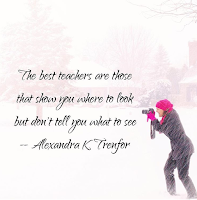 I have this crazy little habit that helps empower me every day for the educational tasks at hand. For the past two years I've taken part in the #OneWord movement and this year my word was "brave." As part of this year's word, everyday I have chosen some phrase and photo to put on Instagram to embolden myself for the day to be educationally brave to make a difference for students. Each phrase has #brave2017 in the comments. Some days I run across quotes that resonate with me, some days I write what is in my head, and some days I make a real effort to Google a theme or "educational quotes" and find something for the day.
I have this crazy little habit that helps empower me every day for the educational tasks at hand. For the past two years I've taken part in the #OneWord movement and this year my word was "brave." As part of this year's word, everyday I have chosen some phrase and photo to put on Instagram to embolden myself for the day to be educationally brave to make a difference for students. Each phrase has #brave2017 in the comments. Some days I run across quotes that resonate with me, some days I write what is in my head, and some days I make a real effort to Google a theme or "educational quotes" and find something for the day.A quote that I have seen over and over on multiple occasion is the one in the image above: "The best teachers are those that show you where to look but don't tell you what to see." It is attributed to Alexandra K. Trenfor. Out of curiosity one day I decided to see who exactly this person was because I felt this little nugget of wisdom was so powerful. Imagine my surprise when not only I could not find anything about the person but found that other people had been on the same search. There is a bit of irony not lost on me that educators on a regular basis repost this quote and put it on educational websites and it can't really even be checked for authenticity. I mean, when I posted it I continued to attribute it to Alexandra K. Trenfor but I don't really know if that's right or not.
That left me thinking about the overwhelming need for curation of information in today's world. When we want to quote a website, oftentimes it is downright impossible to find the correct citing unless one uses an online bibliography that searches it from the URL and sometimes even then we come up empty handed.
Today as I was sick in bed I found myself digging around the internet looking for information on some topics I've been pondering and I came across this video that was uploaded in 2007. It's titled "The Machine is Us/ing Us." It speaks into the fact that WE are the creators of the web by the things we post on a regular basis, like this blog for instance. I am putting information out to a worldwide audience that might sway someone towards or away from a certain way of thinking about education. The "machine" is us but at the same time the machine is using my information, thoughts, and clicks to develop itself further. It's both alarming and intriguing to think of the power every John Q. Public has in the world today.


No comments:
Post a Comment